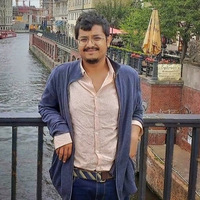- Ameem Lutfi is a historical anthropologist specializing in transnational mobility and military-labor markets. His cur... moreAmeem Lutfi is a historical anthropologist specializing in transnational mobility and military-labor markets. His current book project titled ‘Conquest Without Rule: Baloch Portfolio-Mercenaries in the Indian Ocean’ looks at state-building in the region from the perspective of a diasporic group which has maintained a strong presence in the military infrastructure of various states in the region since at least the 16th century despite not having a state of their own. Lutfi holds a Ph.D. in Cultural Anthropology from Duke University. Prior to joining MEI, he was a Postdoctoral Fellow at the Oriental Institute at the Czech Academy of Sciences.edit
Research Interests:
Research Interests:
The present study investigated the clinical and hematological effects of chronic lead exposure in the population residing inShadi Pura, a small industrial zone in Lahore, Pakistan. A cross-sectional analysis of 149 participants recruited... more
The present study investigated the clinical and hematological effects of chronic lead exposure in the population residing inShadi Pura, a small industrial zone in Lahore, Pakistan. A cross-sectional analysis of 149 participants recruited through health camps was conducted to explore the hematological manifestations of environmental lead exposure, focusing on various red blood cell (RBC) indices and morphology. Moreover, the study examined the differences in the impact of lead exposure on RBC indices and morphology between men, women, and children. Participants exhibited symptoms of lead poisoning, including fatigue, muscle pain, and headache, with a significant percentage of women (44%) reporting miscarriages. Iron deficiency anemia was highly prevalent among all sub-groups of the study population, with adult females showing a significantly higher prevalence than adult males. Male children were the most affected subgroup, with 93% displaying anemia. The RBC count in children remaine...
Research Interests:
Despite being around for less than a century, institutional diplomats are usually considered indispensable to peaceful international relations. Unconventional actors outside the foreign services co...
Research Interests:
Research Interests:
This article investigates how populists at home and maverick dealmakers abroad, strongman leaders are increasingly side-lining official career diplomats by using informal diplomats drawn from trans...
Research Interests:
This essay approaches the Partition of British India through the perspective of the Baloch inhabitants of Karachi, who locate the city at the centre of diverse political geographies and cultural lineages. We specifically look at the... more
This essay approaches the Partition of British India through the perspective of the Baloch inhabitants of Karachi, who locate the city at the centre of diverse political geographies and cultural lineages. We specifically look at the testimony of the residents of Karachi’s historic neighbourhoods of Qiyamahsari and Lyari. Their narratives demonstrate how Partition spelled the end of certain forms of sociopolitical life in the city, while reaffirming others. Together, these narratives help re-conceptualise Partition as a temporally and spatially dilated series of migrations and transformations, rather than as an event unproblematically tethered to the space and time of nation-states.
Research Interests:
Iraq is now the centerpiece in a tug of war between the Gulf Cooperation Council (GCC) allies, led by Saudi Arabia, and Iran in the proxy war for regional hegemony. Over the last few years, as it struggled to emerge from the wilderness,... more
Iraq is now the centerpiece in a tug of war between the Gulf Cooperation Council (GCC) allies, led by Saudi Arabia, and Iran in the proxy war for regional hegemony. Over the last few years, as it struggled to emerge from the wilderness, Iraq has managed to keep one foot on each side of the fence. Adel Abdul-Mahdi, its current Prime Minister, visited both Riyadh and Teheran in a span of 10 days earlier this year. He also tried his luck at playing the peacemaker by inviting officials from both countries to share a table at the Baghdad summit in April, though little came out of it, apart from polite murmurings. Now, however, the US and its allies have decided that the time has come for Iraq to get off the fence and choose a side.
Research Interests:
Unwelcome in the West after the killing of a journalist, the Saudi crown prince looks East for economic inspiration – and the chance to play an unlikely role as peacemaker... more
Unwelcome in the West after the killing of a journalist, the Saudi crown prince looks East for economic inspiration – and the chance to play an unlikely role as peacemaker
https://www.scmp.com/print/week-asia/opinion/article/2187361/spurned-west-saudi-crown-prince-mbs-heads-china-becomes-unlikely
https://www.scmp.com/print/week-asia/opinion/article/2187361/spurned-west-saudi-crown-prince-mbs-heads-china-becomes-unlikely
Research Interests:
In early 2011, mass protests erupted in the Arab world, toppling decades-old regimes in what was to be known as the Arab Spring. Despite similar challenges from the ground, in Bahrain, the security forces were able to quell the uprising... more
In early 2011, mass protests erupted in the Arab world, toppling decades-old regimes in what was to be known as the Arab Spring. Despite similar challenges from the ground, in Bahrain, the security forces were able to quell the uprising and help their century-old Al-Khalifa regime retain power. In this Insight piece, Ameem Lutfi highlights the network of ethnic Baloch mercenaries whom the Al-Khalifas have been relying on for nearly a century to fill the rank and file of their security services.
